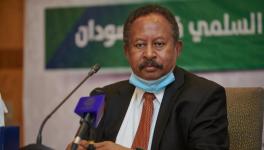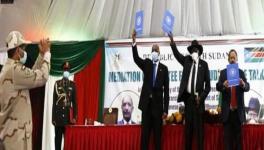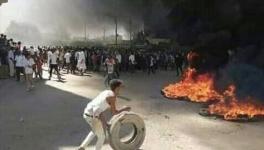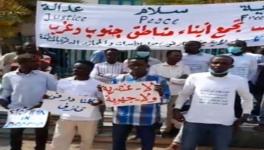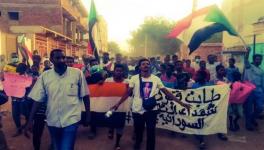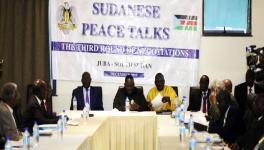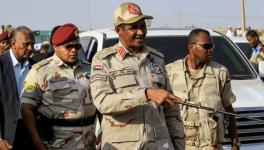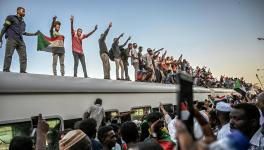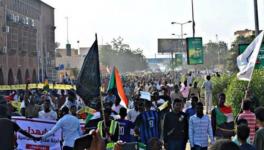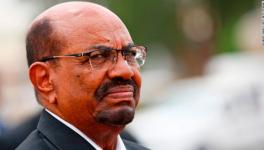Army Threatens Protesters in Sudan, After Negotiations Fail
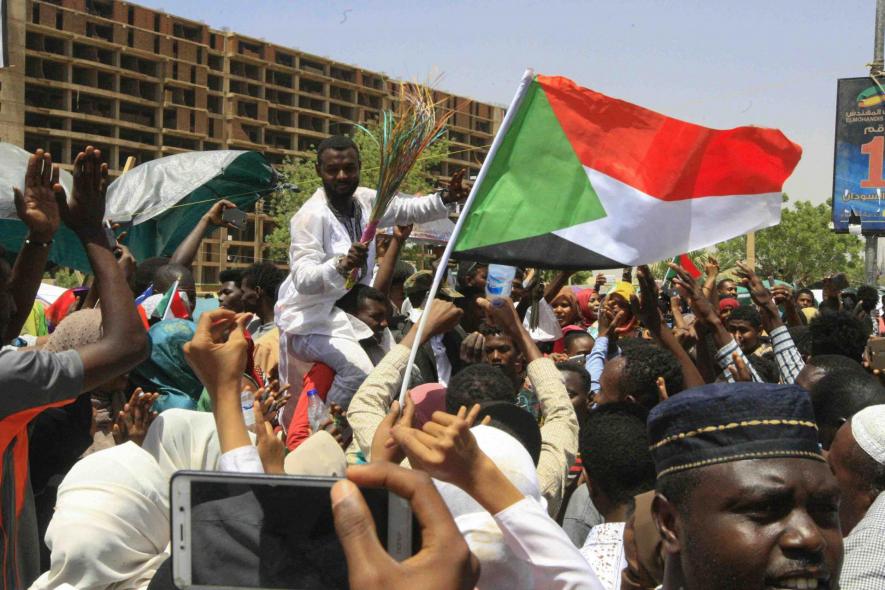
Photo: Middle East Online
The vice-president of Transitional Military Council (TMC), which is currently holding power in Sudan, has threatened the protesters at a press-conference on Tuesday. Insisting on clearing the roads blocked by the mass sit-in demonstration, which has now reached its 25th day, General Mohamed Hamdan Daglo has threatened the protesters saying, “We will not accept chaos. We will deal with it firmly in accordance with the law … After today, there will be no chaotic scenes.”
A day before this threat, protesters complained that army personnel, dressed in civilian clothes, tried to dismantle the barricades they had raised and disrupt their demonstration. The mass demonstrations have virtually laid a siege at the army headquarters and the defense ministry with thousands occupying the surrounding streets.
All of this comes after the negotiations between the TMC and the Declaration of Freedom and Change Forces (DCFC), to affect a transfer of power to civilian authorities, failed yet again. However, the army had allegedly made a false announcement that protest leaders had agreed to clear some roads, a railway line and two bridges which lead to the headquarters.
“The military council is a copycat of the toppled regime. The army is trying to disperse the sit-in by removing the barricades … We are calling on our people to come immediately to the sit-in area. We are calling on the revolutionaries to protect the barricades and rebuild them”, said the Sudanese Professionals Association (SPA).
Consisting of different professional organizations and trade unions which led the uprising that toppled Omar al-Bashir on April 11, the SPA, along with some opposition political parties, make up the DCFC.
Since Bashir’s fall, the DCFC has been engaged in a tussle with the army, which through the Transitional Military Council, has been holding the power to govern the country. Under pressure of mass demonstrations, the army having traveled a distance from its original announcement that it would rule the country for two-years, had started negotiations on the terms of transfer of power.
In a previous meeting, both sides had agreed to form a joint transitional council, including both civilians and military representatives, to rule the country for a period before calling for elections. However further progress was not made. From Saturday to Monday, the political committee of the TMC met the DCFC three times, but the two sides could not reach an agreement on the ratio of representation of civilians to military personnel in the joint council.
The TMC is reportedly insisting on a council of ten members, which includes seven military personnel and three civilians, whereas the DCFC has demanded the creation of a 15 members council, seven of whom will be military representatives and the remaining eight will be civilians.
Justifying the threat he gave after negotiations failed, Daglo has said, “We want food and services to be supplied to the people in the states outside Khartoum, so we wouldn’t allow this chaos to be continued.” It was the increasing inability of the masses to afford food under Bashir’s regime that originally sparked the uprising on December 19.
However, the roads and rail lines he has demanded to be cleared directly connect to the army headquarters. “For a revolution, if [we] don’t block the roads, then we won’t be putting pressure on these people,” one of the protesters reportedly said.
The situation is currently tense. Troops of the paramilitary group called the Rapid Security Forces (RSF), headed by Daglo himself, “are dotted strategically around town in trucks bristling with weapons,” FT reported. The RSF is known to have absorbed among its ranks a significant portion of the Janjaweed fighters who were used by al-Bashir to commit genocide in Darfur, for which he has been convicted by the International Criminal Court.
Daglo also has the support of the US-backed Saudi-UAE alliance, to which, after the ousting of Bashir, he has reassured that Sudan will continue to bomb Yemen. It was perhaps as a token of appreciation that Saudi Arabia and UAE have promised $3 billion in aid to Sudan.
This has further infuriated the demonstrators who perceive this, not as a humanitarian aid, but as an intervention by foreign powers to bolster the military regime against the civilian forces whose struggle ousted al-Bashir from power.
New barricades have been erected by defiant protesters after Daglo’s threats, according to images uploaded on social media by the protesters on the ground. Videos uploaded show many thousands more marching towards the army headquarter to join the demonstration.
While some sections of the DCFC seem to be showing willingness to have a more conciliatory approach in the negotiation with the TMC, the SPA, which spearheaded the uprising, has called for an escalation of pressure. Backing the SPA’s call, the Sudanese Communist Party has said in a statement that the “forces of the revolution must start preparing for the stage after the victorious sit-in; that is the launching of the political general strike and the campaign for civil disobedience.”
Get the latest reports & analysis with people's perspective on Protests, movements & deep analytical videos, discussions of the current affairs in your Telegram app. Subscribe to NewsClick's Telegram channel & get Real-Time updates on stories, as they get published on our website.









